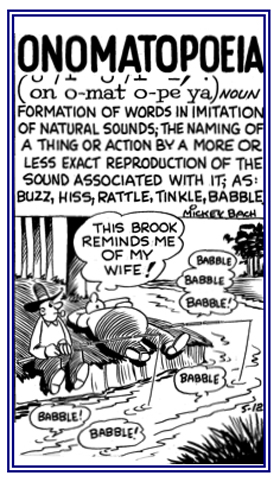-poeia, -poie, -peia, -poiesis, -poesis, -poeic, -poetic, -poietic, -poetical, -poietical +
(Greek: making, producing, creating, creative, forming, formation)
In medical terminology, the "creation" or "production" of that which is named by the combining root.
2. Etymology: from Late Latin, which came from Greek onomatopoiia, "the making of a name or word" (in imitation of a sound associated with the thing being named); from onomatopoios, from onoma (genitive form of onomatos), "word, name" + a derivative of poiein, "to compose, to make"; resulting in "the making of names", "to compose a word or words", and "coining or creating words".

Go to this Word A Day Revisited Index
so you can see more of Mickey Bach's cartoons.
Onomatopoeias are not universally the same across all languages; they conform to some extent to the broader linguistic system they are part of; so, the sound of a clock may be tick tock in English and tik tak in Dutch or tic-tac in French.
Sucked at crusty calloused heels;
Whiffled back in lush repose:
Whished to whip around clashing wheels.
2. The formation or use of words; such as, buzz or murmur that imitate the sounds associated with the objects or actions they refer to; such as, "Onomatopoeic words imitate or express the sounds of noises."
2: A reference to words that are formed in imitation of natural sounds.
2. In psychiatry, the tendency to make new words of this type is said to characterize some people with schizophrenia.
2. The excitation of passion by rhetoric, poetry, or music: At the concert, all of the audience fell into absolute silence as the passages played by the soloist put them into a trance of pathopoeia in which some of the listeners even started to cry because it was so beautiful and moving.
It also generally contains a statement of average dosage. The first United States pharmacopeia was published on December 15, 1820, printed in both Latin and English, and its 272 pages included 217 drugs which were considered worthy of recognition.
USP, United States Pharmacopeia, a legally recognized compendium of standards for drugs, published by The United States Pharmacopeial Convention, Inc., and revised periodically. It also includes assays and tests for the determination of strength, quality, and purity.
2. A composition in verse rather than in prose.
3. A literary composition written with an intensity or beauty of language more characteristic of poetry than of prose.
4. A creation, object, or experience having beauty suggestive of poetry.
5. Etymology: from Middle French (about 1400 to 1600) poème (14th century); from Latin poema, "verse, poetry" from Greek poema. "thing made or created, fiction, poetical work"; from poein, "to make or to compose".
2. A person who has the gift of poetic thought, imagination, and creation, together with eloquence of expression.
3. Someone who is especially gifted in the perception and expression of the beautiful or lyrical.
4. Etymology: from Old French poete (12th century), from Latin poeta, "poet, author"; from Greek poetes, "maker, author, poet"; from poein, "to make" or "to compose".
2. Having a quality or style characteristic of poetry.
3. Suitable as a subject for poetry.
4. Of, relating to, or befitting a poet: poetic insight.
5. Characterized by romantic imagery.


